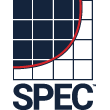SPEC releases SPECjbb2005 for measuring
Java Virtual Machine (JVM) server performance
WARRENTON, Va., June
16, 2005 – The Standard
Performance Evaluation Corp. (SPEC) has released SPECjbb2005, an updated
benchmark for evaluating the performance of servers running typical Java
business applications. The benchmark can be used across several versions
of UNIX, Windows, Linux and other operating systems.
SPECjbb2005 was developed by SPEC�s Java subcommittee, with
contributions from BEA, Darmstadt University of Technology, HP, IBM, Intel
and Sun. The benchmark�s workload represents an order processing application
for a wholesale supplier. Systems integrators and end users can use the
benchmark to evaluate performance of hardware and software aspects of Java
Virtual Machine (JVM) servers. Hardware vendors can use SPECjbb2005 to
analyze their platform�s scalability when running Java applications. Software
vendors can use it to evaluate the efficiency of their JVMs, just-in-time
compilers (JITs), garbage collectors, thread implementations, and operating
systems.
Updates reflect current practices
The new benchmark is a major update to SPECjbb2000, and
results from the two benchmarks cannot be compared. The following important
changes have been made to the benchmark to reflect current practices of Java
application developers and new software codes:
- The internal database is now modeled using HashMaps
or TreeMaps in cases where operations on a table require sorting.
- System.gc calls are no longer included in the main
part of the benchmark.
- Handling of financial data and calculations has been
changed from float to BigDecimal to match current industry practice.
- Several features from Java 5.0 have been added to the
benchmark.
- Parts of the code were reengineered to better reflect
object-oriented styles of programming.
- Transaction logging is now done by building and writing
DOM objects using the JAXP XML functionality in Java 5.0.
- The benchmark can be deployed using multiple Java Run-Time
Environment (JRE) instances, each independently handling the transaction
load on its own data tables.
Real-world workload
SPECjbb2005 simulates a wholesale company with warehouses
that serve different districts. It mimics customer operations such as placing
orders or requesting the status of an existing order, and operations within
the company, such as processing orders for delivery, entering customer payments,
checking stock levels, and requesting a report on recent activity by a given
customer.
The benchmark measures throughput of the underlying Java
platform, which is the rate at which business operations are performed per
second. It steps through increasing amounts of work, providing a graphical
view of scalability. Performance is assessed by two metrics: bops (business
operations per second), which measures overall throughput for all of the
JVMs in a benchmark run, and bops/JVM, which measures the performance
and scaling of a single JVM.
�Like its predecessor, we expect that SPECjbb2005 will
quickly become an industry standard,� says Ricardo Morin, chair of the SPEC
Java subcommittee. �It will be an important yardstick that companies can
use to compare servers running business applications written in Java.�
Initial results, availability
Performance results for SPECjbb2005 will be available on
SPEC�s web site at www.spec.org/jbb2005/results/
beginning on June 22. SPECjbb2005 licensees may publish their own results in
accordance with SPEC�s run and reporting rules. The minimum configuration on
which the benchmark has been tested successfully (with eight warehouses) is a
laptop with a 1.7Ghz Pentium M processor and 1GB of memory using a 512MB heap.
SPECjbb2005 is available now on CD-ROM from SPEC for $500. Discounts
are available for eligible universities and non-profit organizations. SPECjbb2000
licensees can upgrade to the 2005 benchmark for $250.
About SPEC
SPEC (www.spec.org)
is a non-profit organization that establishes, maintains and endorses standardized
benchmarks to measure the performance of the newest generation of high-performance
computers. Its membership comprises leading computer hardware and software
vendors, universities, and research organizations worldwide. For more
information, contact Dianne Rice, SPEC, 6585 Merchant Place, Ste. 100, Warrenton,
VA 20187, USA; phone: 540-349-7878; fax: 540-349-5992; e-mail: [email protected];
web: www.spec.org.
###
Press contacts: Bob
Cramblitt, Erin Hatfield
Cramblitt & Company
919-481-4599; info@cramco.com
For additional information about SPECjbb2005:
Frequently asked questions: http://www.spec.org/jbb2005/docs/FAQ.html
Design document: http://www.spec.org/jbb2005/docs/WhitePaper.html




